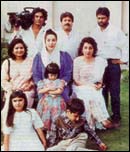The Rediff Interview/Nawaz Sharief
'This is the time to learn from past mistakes. Can you tell me what we have gained in the past fifty years?'
At the SAARC convention the Indian prime minister talked about
co-operation and trade within the SAARC framework. What role will
Pakistan play in this?
 We want to do this within the SAARC charter and through
bilateral talks. We will lose our dependence on many if we increase
trade with each other. This will provide employment opportunities
to many people. But we
have to progress on other fronts as well. I have mentioned Kashmir,
I have also asked Mr Gujral to return his troops
from Kashmir to create proper atmosphere for these talks.
We want to do this within the SAARC charter and through
bilateral talks. We will lose our dependence on many if we increase
trade with each other. This will provide employment opportunities
to many people. But we
have to progress on other fronts as well. I have mentioned Kashmir,
I have also asked Mr Gujral to return his troops
from Kashmir to create proper atmosphere for these talks.
The greatest problems regarding Kashmir is that troops cannot
recede as long terrorism exists there.
There are many things said that are in no way related to reality.
We should therefore, be realistic. If we are really keen about
solving problems then this is not the time to complain. This is the
time to learn from past mistakes and realise our gains
and losses. Can you tell me what we have gained in the past
fifty years? We have fought wars and spent heavily on defense.
This does not allow us
to pay attention to other priorities. We are unable to spend
as much on our social sector. So it is time to take into account
where we have gained or lost. We should seriously
think about living like good neighbours.
Are you going to submit some proposal about slashing this
expenditure during bilateral talks?
There are many suggestions which will come by gradually when we
start discussions with each other.
But this will happen only when we make some progress, when we
are more confidence and are closer to each
other. I believe that this will be one of the issues we shall
be able to discuss.
But this expenditure should be curtailed.
The only way is to curtail it on both sides through mutual agreement.
Even as the talks continue pertaining to different issues
is it not possible to keep everything aside and try to improve
relations?
We do want progress on all the fronts. But if we progress
on all other fronts except Kashmir, that also is not correct. I
think Gujralsaheb also has certain limitations which I understand.
I too am in a similar situation. If we really want to resolve the issue
and resolve it at all cost, then there is no reason why it should
not be solved.
There is a constant allegation from India that Pakistan promotes
terrorism here --formerly it was in Punjab now in Kashmir.
If this feeling persists it will hinder
the improvement of relationships.
Our people also blame India for such things. The practice
has been to blame Pakistan whenever anything goes wrong in India.
I want to change it. I wish to change these old practices and
start a fresh approach. Is it not possible?
What do you have to say about this allegation? Are they
false?
No, it is because of these allegations that we have decided
to sit and talk. I had talked about it to Gujralsaheb.
Sometimes our diplomats are beaten up in Delhi. Such things have
happened here also. Why don't we behave with each other in a more
civilised fashion? The world has come out of the rut that we are
still wallowing in. All these are stumbling stones and should
be removed.
The ISI in the bugbear in India just as RAW must be in Pakistan.
How do we reduce this suspicion? Whether it is the Bombay blasts
or the Kashmir issue for which Pakistan is blamed or the Mohajir
movement for which India is blamed, tension mounts because
of this suspicion. How can it be averted?
The ISI and RAW will also
have the opportunity to discuss matters with each other when talks
start at the top level. Then they will be able to resolve their
problems on their own, and such things will not happen in future.
You had given a statement that if Azad Kashmir starts agitating
then Pakistan would encounter it with an atom bomb. Do you
have the atom bomb ready?
(Laughs) You were asking such good questions. How come you
are asking this?
Translated by Sudershna Dwivedi
Tell us what you think of this interview
|



